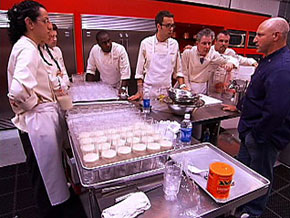
Create a free profile to get unlimited access to exclusive videos, sweepstakes, and more!
The Case Of The Purloined Lychees
Did Otto steal the lychees? Tom looks into the case.

As an avid (ok, obsessed) fly fisherman, I feel a reverence for fish -- the fresher the better. One of my favorite things to do as a young chef was head down to the Fulton Fish Market in the pre-dawn hours to choose fish for my first NYC restaurant, Mondrian. The market was a rough-and-tumble place, but I learned from the experts how to judge the freshness of a fish (look for unclouded eyes) and to distinguish fish that has been well-handled from fish that has been thrown about (bruising the flesh) and fish that was caught only hours ago from fish that has lived for weeks packed in ice while the boat was out at sea. I felt bad waking the chefs up before dawn -- especially because my forays down to the fish market usually happened after a night in the kitchen (and subsequent pub crawl), while I was weary but not yet comatose. Our chefs put on a brave face, but after only a couple hours of sleep, they were clearly hurting. When our chefs were asked to create a sushi dish for their Quickfire challenge, we knew we were asking most of them to step outside their own cultural milieu. That said, I think it was a worthwhile challenge -- especially for this early in the season -- because it would give us a chance to assess the chefs' adaptability, their knife skills, and their knowledge of other cuisines.
I wasn't there during the Quickfire, but watching the footage I was impressed by Ilan's precise work and use of the scallop in its shell. I thought Elia's introduction of olives into her dish was risky, but Chef Hiroshi Shima appreciated the kick of unexpected flavor they provided. Cliff's dish of hamma oysters with ginger, soy, mango and jalapeno showed knife skills and a good grasp of presentation. That he also prepared prawns with hamachi, sisho leaf and daikon shows that he was ambitious, and willing to undertake a lot in only 30 minutes. I was glad to see that he won. Virtually every chef I know spends hours each week supporting charities that are meaningful to him or her. My own causes include hunger relief, through Share Our Strength, and Children of Bellevue, where underserved children receive desperately needed care and social services.
My good friend Kerry Heffernan introduced me to Project by Project, an organization based in NY and L.A. that partners young professionals with community organizations to help them realize their goals. Each year Project by Project chooses a different cause with whom to partner. This year they are raising money for Visual Communications, an organization that promotes media works by and about Asian Americans. One of Project-by-Project's most successful fund-raising events is their annual Food & Wine Tasting Benefit, in which various chefs and vintners prepare tasting plates and tastes of wine for charity-minded individuals. This year, we decided to lend Top Chef's contestants to the cause: Divided into two teams, representing two different Asian cuisines, their task was to work together to dazzle 1,000 guests at the tasting benefit, and raise money for a good cause.
Los Angeles is home to a diversity of Asian cultures, and so our chefs were divided into teams that focused on two that aren't as well known to many Americans -- Vietnamese and Korean. Vietnamese cuisine, like Chinese, relies heavily on seafood and vegetables in stir-fries with rice or rice noodles, but Vietnam's French Colonial past is seen through the use of consomme-like bases in their soups, and subtle herbs such as lemongrass. There is almost always some fresh vegetables and herbs served with a Vietnamese meal, and dipping sauces served alongside the main dish. Korean food, on the other hand, relies heavily on the strong flavors of red chili paste, garlic, and fermented soybeans. Kimchee (spicy, pickled vegetables) and banchan, numerous side dishes, are presented alongside spicy stews of fish, meat and tofu and steamed, short-grain rice. For Americans more accustomed to the delicate flavors of Japanese cuisine, or the careful balance of Thai food, Korean food can be an acquired taste. For those who know it and love it, good Korean food is something of an obsession. I was eager to see how our teams functioned together, and to see how they incorporated what they knew (or learned) about these different cuisines into their event food. I was also eager to see their "game face" -- how they presented themselves among civilians, since this is a big part of being a chef.
Team Vietnam had an advantage in that Josie had worked in a Vietnamese restaurant. She naturally fell into a leadership role, and her knowledge of the cuisine served as an important anchor as the team formed their plan. And while Michael eventually had an issue with Josie's authority on the project (she had a problem with his sloppy knife skills, and rightfully so), the group came together and immediately got to work. The resulting food wasn't perfect, but it was solid and good. Ultimately it was Team Vietnam's overall organization and professionalism that carried them through. They also understood the value of presentation and hospitality. They put affable Betty up front, serving a delicious cucumber and aloe refresher, and she turned out to be a huge asset to the team by connecting with guests and making them feel welcome. Team Korea, on the other hand, started out with a more lackadaisical approach. They opted not to follow anyone's lead, which meant that decisions and planning took a long time. Elia in particular was frustrated at the team's raucous tone and the absence of any direction in the planning. Now let me just say that I've done my share of partying over the years. Chefs are known for their healthy appetites for fun, but the best ones pull it together when the time comes to get serious. Unfortunately, Team Korea seemed hung-over and disorganized right from the start -- a pretty big breach of professionalism.
And then there was the lychee debacle. A case of lychees were loaded onto the bottom rung of Team Korea's cart in the store. When their items were rung up, the team was over their spending limit and some things were returned to the shelves. The cashier never spotted the lychees, and so they made it out of the store with the other ingredients. Without question the lychees would have pushed the team over their budget and would have had to be returned if spotted. It appeared that Otto knew this, because he mentioned it to his teammates as they were loading the car. When the others learned of this breach, they resolved not to use the lychees in the challenge. When I learned of it, I pressed Otto to explain. He acknowledged that allowing the team to make off with a free ingredient showed poor judgment "in the heat of battle." He agreed to return the lychees to the store. Unfortunately, this put Team Korea down a chef as they scrambled to complete their dishes, and their early disorganization came back to haunt them. They opted for a few traditional items -- spicy braised pork, kimchee, sticky rice and lotus chips. I was skeptical about their ability to brine the kimchee in the limited time available, and yet they pulled it off -- it was refreshingly acidic and tasty. Judge Ming Tsai agreed that their kimchee worked, as well as their braised pork. Unfortunately, their rice wasn't great. But the team's real problem was dessert.
Marisa, a professional dessert chef, opted to make a panna cotta -- an odd choice, given that it is a classic Italian cream-based dessert you'd be hard-pressed to find in Korea (they compensated for this by flavoring it with Jasmine tea.). But the real issue was that her proportions were off and she used way too much gelatin in the recipe. Panna Cotta should be smooth, creamy and delicate. Hers was rubbery and hard. On both concept and execution the dessert was a failure. Our decision was clear -- the winner was Team Vietnam. When we brought Team Korea to the judge's table, Marisa quickly blamed Otto's ethical lapse for throwing the team off, because she knew her neck was on the block. Elia, who had also worked on dessert, felt the same. The men, on the other hand, were reluctant to slam Otto because they all knew that his indiscretion with the lychees wasn't the full story behind their loss. When the chefs left the judge's table, Ming Tsai, Gail, Padma and I sat and debated. Which was the bigger issue -- Otto's willingness to score free ingredients, or Marisa's poor execution of dessert?
While we thought that what Otto did fell short of actual stealing, it was clear that there was a moment where he knew the lychees weren't paid for and was willing to use them to his team's advantage. At the judge's table I had one question for Otto: Would he have used the lychees if he could have gotten away with it? Rather than answer, Otto made the decision to leave the competition. I think all good people lapse on occasion, and a competitive headspace can unfortunately get in the way of ethical thinking. Overall, Otto was a good guy, but he made a poor choice. He redeemed himself by bowing out, and saved Marisa in the process.














